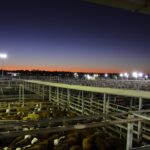The quarterly Safety Networking Group session was hosted by Snapfresh, and explored the health and safety issues surrounding an ageing workforce.
Roslyn Miller, from WHSQ’s Workers Initiative, presented some interesting statistics on the current situation in terms of ageing workers in Queensland, showing that one in eight workers is currently older than 65 with an increasing trend over the last 10 years.
The effects of ageing on the body were summarised, together with the impacts on health and safety in the workplace. It was stressed that with a rapidly ageing workforce, there is a need to identify, develop and implement strategies to help older workers maintain good health and productivity.
Peter Gould, the Workplace Health Safety & Wellbeing Service Manager from Redland City Council, shared his experience and highlighted the programs currently implemented at Redlands City Council, which included elements of Psychosocial Safety, Ageing Workforce and Sedentary Workforce management.
Belinda Lamas presented on the Snapfresh ‘Strategy for Transition of Ageing and Retiring’ (STAR) program which was designed to consider both the business and to support employees as they experience the issues that come with age. The program commenced with an analysis of data around the ageing workforce and then looked at the business and people impacts, and is supported by 3 pillars:
- Health and wellbeing changes to accommodate an ageing workforce.
- Workplace business planning for flexible work arrangements and the transition to retirements.
- Retirement planning, including education on superannuation and pension planning.
Belinda shared an interesting multimedia on a study at the BMW factory in Germany. BMW had recognised that they had an ageing workforce and further accepted that this mirrored the demographics of society and was unlikely to change. The study involved staffing one production line with ‘older’ workers with an average age of 47. Workers were then consulted on what they required to work optimally. Changes were made to the workplace totalling less than $50,000. Changes included, larger type font on screens for easier reading, and mounted magnifying glasses to read text on machine components. After the study had run for some time, data reflected that productivity increased beyond that of other production lines at BMW and defects dropped to zero. (View a news item on the program here.)
Members of the Safety Networking Group then shared their experiences with their organisations’ approaches to an ageing workforce.
Thanks to Snapfresh for once again hosting the Safety Networking Group
The next Safety Networking Group function will be in May 2017.
ABOUT THE SNG:
In 2005 QRMC founded the Safety Networking Group for senior safety professionals working in the greater Brisbane metropolitan area. QRMC continues to coordinate and arrange for speakers to present at quarterly meetings and discuss information on contemporary WHS issues. Group members also share information from their workplaces or industries, which other members frequently find interesting and useful.
More information on the Safety Networking Group can be found on our website. Senior safety professionals contemplating attending meetings in Brisbane can contact QRMC to express an interest.









